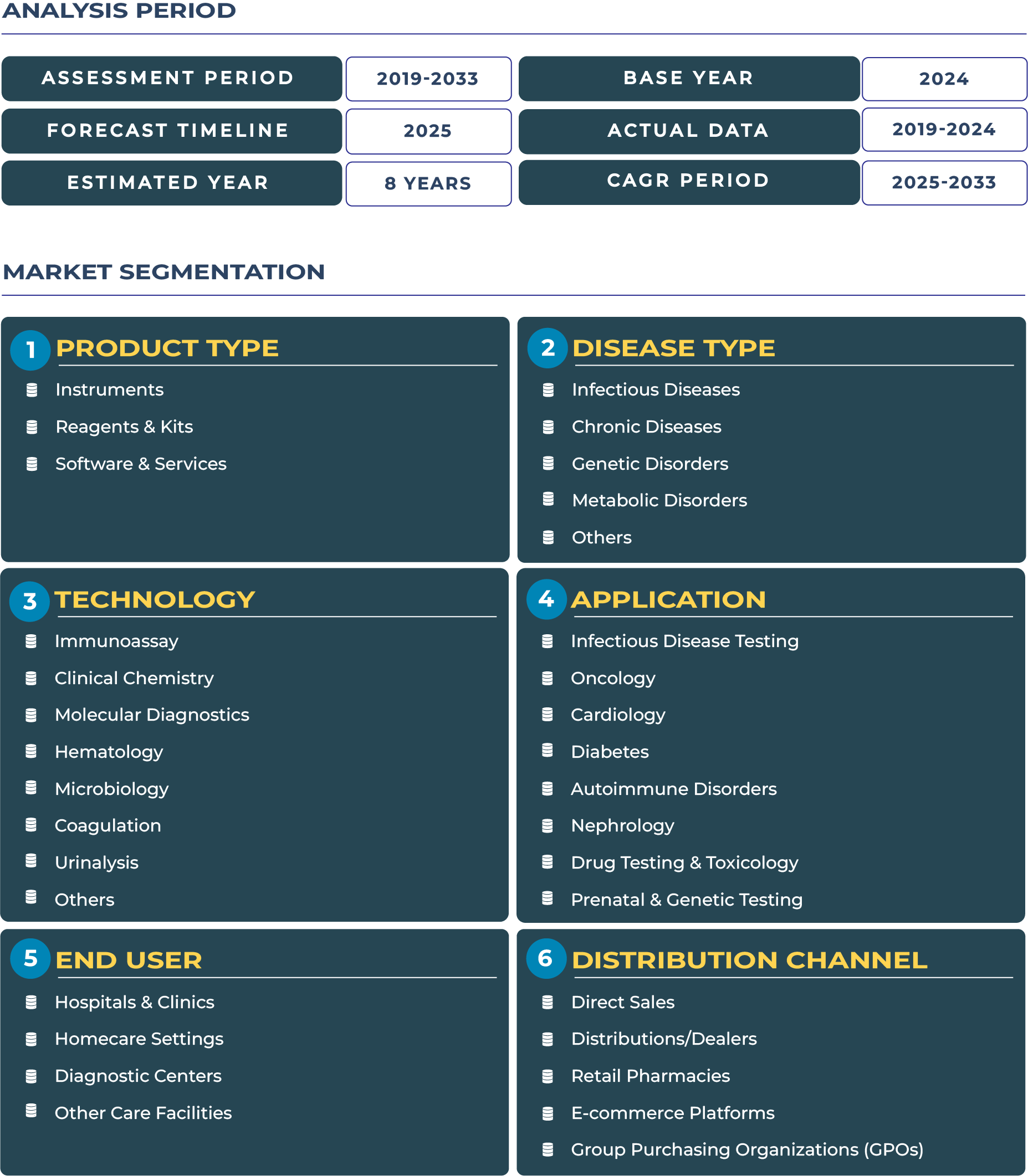Population-Driven Healthcare Transformation: Nigeria In-vitro Diagnostic Market on the Rise
Nigeria’s healthcare transformation story is increasingly being defined by its fast-growing in-vitro diagnostic (IVD) industry. With a population exceeding 220 million, the nation faces an enormous burden of communicable and non-communicable diseases that demand timely diagnosis and scalable testing infrastructure. The country’s unmet orthopedic and diagnostic needs, coupled with a young demographic and underpenetrated healthcare system, are shaping a fertile ground for innovation in diagnostic testing. As Nigeria strives to expand access to healthcare across urban and rural zones, diagnostic efficiency has emerged as a key enabler of effective treatment and early disease intervention.
The Nigeria in-vitro diagnostic market is estimated at USD 209.1 million in 2025 and is projected to reach USD 331.1 million by 2033, growing at a CAGR of 5.9% from 2025 to 2033. This steady expansion is supported by the surge in urban hospital networks, the modernization of diagnostic laboratories, and the entry of international IVD players targeting affordability-driven market segments. The government’s focus on expanding laboratory capabilities under the Federal Ministry of Health and its growing collaboration with private diagnostic firms are reshaping Nigeria’s diagnostic landscape for long-term growth and resilience.
Expanding Healthcare Access and Rising Urbanization Accelerate Market Growth
One of the strongest growth drivers of the Nigeria IVD market is its vast and youthful population base that fuels continuous demand for diagnostic and preventive care. With over 50% of Nigerians under the age of 30, chronic disease screening, maternal health testing, and infectious disease monitoring have become critical national healthcare priorities. The expansion of urban medical infrastructure, particularly in Lagos, Abuja, and Port Harcourt, is driving investments in laboratory instruments, reagents, and testing kits to support large patient volumes.
Furthermore, the growth of private hospitals and diagnostic centers is changing the market structure. Facilities such as the Lagos University Teaching Hospital and private providers are investing in molecular diagnostic and immunochemistry platforms to enhance diagnostic precision. The increasing involvement of international organizations and donor-funded programs in disease surveillance and blood safety initiatives further supports growth across Nigeria IVD ecosystem. The result is a gradual modernization of healthcare delivery, anchored in improved diagnostic accuracy and patient care.
Funding Gaps, Infrastructure Challenges, and Supply Chain Constraints Restrict Growth
While Nigeria in-vitro diagnostic industry shows strong potential, several systemic challenges hinder its full-scale expansion. Limited public healthcare funding and inconsistent reimbursement policies restrict the purchase and maintenance of modern diagnostic instruments in government hospitals. According to the Budget Office of the Federation, healthcare spending as a share of GDP remains below the recommended 15% Abuja Declaration target, impacting diagnostic capacity development.
Another major restraint is the logistics and supply chain complexity. Poor road infrastructure, coupled with regional security concerns in northern states, limits the ability to distribute reagents and testing supplies efficiently. As a result, rural areas experience diagnostic delays, reducing accessibility for vulnerable populations. The shortage of trained biomedical engineers and laboratory technicians also hinders equipment calibration and maintenance, leading to high operational costs for diagnostic providers. Addressing these barriers requires coordinated public-private partnerships to build sustainable infrastructure and localized production of reagents and kits.
Private Sector Expansion and International Partnerships Define Emerging Trends
In recent years, the Nigeria in-vitro diagnostic sector has been characterized by an increasing wave of private sector participation and international collaborations. Cities like Lagos and Abuja have become hubs for advanced medical testing, with private laboratories deploying automated analyzers and digital reporting systems. The rapid adoption of mobile health diagnostics and telemedicine-supported testing is also bridging the gap between urban centers and remote communities.
Nigeria’s healthcare sector is witnessing an influx of partnerships between international IVD leaders and local distributors to enhance accessibility. Training collaborations between the Nigeria Centre for Disease Control (NCDC) and global health organizations are improving laboratory standards and biosafety compliance. Donor-funded programs targeting HIV, tuberculosis, and malaria testing have brought state-of-the-art diagnostic kits and reagents to public hospitals, accelerating disease detection and data collection. These collaborations not only strengthen Nigeria’s diagnostic infrastructure but also create employment opportunities and knowledge transfer in laboratory sciences.
Emerging Opportunities: Localization, Digital Diagnostics, and Outreach Models
The future of Nigeria IVD market lies in localized manufacturing, digital transformation, and innovative outreach models. Establishing reagent production units within the country can reduce foreign exchange exposure and supply delays. Furthermore, mobile diagnostic laboratories are gaining traction, particularly in rural regions where access to testing facilities remains limited. These mobile units, equipped with basic biochemistry and hematology analyzers, are extending diagnostic coverage to underserved populations.
Digitalization of diagnostic workflows represents another major opportunity. Cloud-based reporting, integrated patient data systems, and tele-laboratory services are revolutionizing how healthcare providers interpret and share results. As internet penetration improves, digital IVD platforms will enhance patient outcomes while reducing urban-rural healthcare disparities. Nigeria’s growing startup ecosystem, in partnership with academic institutions and global medtech firms, is expected to fuel this evolution further, aligning with the country’s long-term goal of building a self-sufficient diagnostic ecosystem.
Competitive Landscape: Global Leaders and Local Innovators Powering the Future
The Nigeria in-vitro diagnostic market is served by both international corporations and domestic firms aiming to balance affordability and quality. Global companies such as Roche Diagnostics and Abbott Laboratories have expanded their presence through distributor networks and hospital collaborations. These firms supply advanced testing systems for immunoassay, hematology, and molecular diagnostics to Nigeria’s tertiary hospitals and private labs.
Local firms like SYNLAB Nigeria and Clinix Healthcare are strengthening diagnostic service coverage through nationwide laboratory networks. These organizations are increasingly investing in automation and workforce training to improve efficiency and test accuracy. A strategic focus on establishing hubs in Lagos and Abuja allows players to mitigate logistical risks while reaching a wider customer base. The combination of global expertise and local execution is positioning Nigeria as a promising frontier market for diagnostic innovation in Sub-Saharan Africa.







